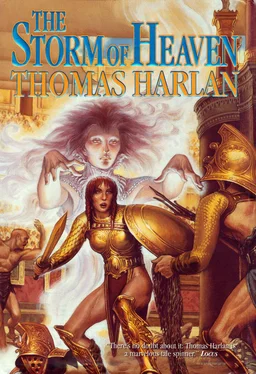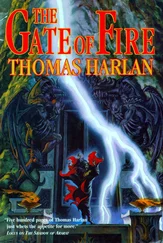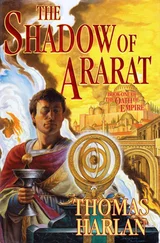Thomas Harlan - The storm of Heaven
Здесь есть возможность читать онлайн «Thomas Harlan - The storm of Heaven» весь текст электронной книги совершенно бесплатно (целиком полную версию без сокращений). В некоторых случаях можно слушать аудио, скачать через торрент в формате fb2 и присутствует краткое содержание. Жанр: Фэнтези, на английском языке. Описание произведения, (предисловие) а так же отзывы посетителей доступны на портале библиотеки ЛибКат.
- Название:The storm of Heaven
- Автор:
- Жанр:
- Год:неизвестен
- ISBN:нет данных
- Рейтинг книги:4 / 5. Голосов: 1
-
Избранное:Добавить в избранное
- Отзывы:
-
Ваша оценка:
- 80
- 1
- 2
- 3
- 4
- 5
The storm of Heaven: краткое содержание, описание и аннотация
Предлагаем к чтению аннотацию, описание, краткое содержание или предисловие (зависит от того, что написал сам автор книги «The storm of Heaven»). Если вы не нашли необходимую информацию о книге — напишите в комментариях, мы постараемся отыскать её.
The storm of Heaven — читать онлайн бесплатно полную книгу (весь текст) целиком
Ниже представлен текст книги, разбитый по страницам. Система сохранения места последней прочитанной страницы, позволяет с удобством читать онлайн бесплатно книгу «The storm of Heaven», без необходимости каждый раз заново искать на чём Вы остановились. Поставьте закладку, и сможете в любой момент перейти на страницу, на которой закончили чтение.
Интервал:
Закладка:
Rufio shook his head slowly, though what she said was true.
"And your son, what would you do with him?"
Martina pursed her lips and looked away, her gaze straying to the crib in the corner of the room. In it, sleeping deeply-at least for this little while!-was her son by Heraclius. Little Heracleonas had come into the world early and roughly, in a tent in the mountains of Armenia, but had seemed a hale child. Now, nearly a year later, he was troubled by vague illness. A priest of Asklepius came every two or three days and looked upon the child, but it seemed that nothing could be done to make him strong. He could not even walk yet.
Like my husband, brooded Martina. Hidden powers move against us, denying us happiness.
"I do not know," she said, turning back to Rufio. "One of my stepsons has already died by odd circumstance, and the other, poor Constantius, fears to be seen with me. If I flee, taking Heracleonas, he may die before I can find refuge. What will happen to Constantius then? While his father lives, while I am here and my son is alive, he is safe from the attentions of these parasites."
Martina glared at Rufio, who spread his hands, showing his agreement. She bit at her nail, then picked up one of the long quill pens that lay on the countertop. She needed something in her hands.
"If I go, then Theodore will return. Papers will surely appear, making him the heir, the regent of his invalid brother. He will be Emperor, if not in name, then in fact."
Rufio watched the Empress carefully, for she had begun to change under the pressure of her situation. When she had first been brought from Africa to live in the house of her uncle, to be tutored in art and literature, she had been quiet and demure. Compliant, even. Far more interested in the doings of books and painting, of sculpture and the theater, than the tawdry business of who stood closest to the Emperor. The guard captain sighed quietly. Heraclius and his niece had married out of love. Such things were not done, particularly among the nobility. Certainly never the Emperor!
Yet, he insisted. Even his closest allies argued against the match… and now, here we are.
Martina had shed her compliance, her naivete, in the harsh training yard of the palace. Life in the Bucoleon was simple-if the Emperor smiled upon you, then you prospered. For this moment, while Heraclius lay between life and death, everything was out of balance. While he lived, Martina could continue to exist, even when the great lords and priests were dead set against her. Once he died…
"I will not let that fool replace my husband." Martina's voice was hard.
Then too, there was a deep and abiding hatred between the Empress and her other uncle, Prince Theodore. Rufio did not know where it had sprung from, but from the first day that the little girl had been in the palace, that tension had existed between them. Only the love that both parties shared for Heraclius had kept peace in the house. Now that they dealt directly with each other, the dislike had deepened. Rufio was well aware that Theodore held no love for him either. Should the Prince become regent, he would be lucky to escape with a head on his shoulders.
Martina smiled coldly, her fingers smoothing the quill down on the pen.
"Captain, we will persevere. Tell your young Scandian to make more of his potion. I will find a way to see that my husband takes more of it rather than less."
Rufio nodded and rose, hearing a tone of dismissal in her voice.
Very Empresslike, he thought to himself, pleased.
"Wait." Martina sat again at the desk, turning one of the lamps so that it gave her better light. A cup of red ink sat close at her hand. She dipped the quill and then, with a quick motion, scribed a signature on the scroll in front of her. "These papers are ready-place them on the logothete of the treasury's desk before you go to sleep."
Rufio grimaced, but he took the papers. They were neatly lettered, and not by any scribe in the palace. Those fellows needed coin as badly as any did, and were notorious for making extra copies of interesting things that passed over their writing desks.
Three crimes against the state in the passage of one day, he thought glumly to himself. My record improves.
Without looking at the fresh signatures, he placed the drafted laws into leather slipcovers and bound them up with a special dark red twine. Martina bent close, her head almost touching his own, and dripped wax onto the knots. Her small, creamy-white hand stamped down hard with the sigil. Rufio tried not to breathe, but the heady aroma of the Empress' hair, perfume and hot wax filled his nostrils.
"Done," she said smartly, tucking a strand of hair back behind one ear. There was a smudge of ink on her cheek. "Good night, Rufio. I will return the ink and the binding twine to their proper places."
Rufio did not answer her smile or the wicked gleam in her eye. The patricians who held the esteemed and noble offices of the Keeper of the Imperial Inkstand and the Holder of the Legal Binding were corrupt and venal men. It pleased the Empress that she, or her servants, could make free with their signs of office in the depth of night. It made Rufio nervous, for those men already held Martina in contempt. Slighting them in this way only bred more ill will.
He bowed and went out through the panel in the wall.
Behind him, Martina stood at the crib, one slim hand brushing the sleeping face of her child. She was terribly lonely, bereft of husband and family, but she dared not keep Rufio with her long. His discovery with her, particularly without a proper escort, would mean his death and her disgrace. This galled her, for she knew from the histories that previous empresses had entertained whole troops of gladiators, grooms, foreign princes, even chariot drivers and street sweepers in their chambers. But then the Empire had been at peace, or their husbands had countenanced such behavior in the interests of public image.
Or they were powers in their own right.
Moodily, she stared out the window. The moon was high enough to illuminate the crowded maze of buildings, some new, some decrepit, which made up the palace.
I am in a not particularly well kept up cage, she thought, not for the first time. I need an advantage, an ally, something to hold back these jackals and wild dogs… I need a friend.
CHAPTER SIX
The Insula Tiberina, Roma Mater
"Hello, Helena."
Late-spring rains had come to Rome, washing the marble and plaster buildings clean. The ash and grit drifting down out of the sky were gone. For the first time in months the air seemed clean and clear, and a spring sun shone down, making the temples on the Capitoline Hill glow with a blaze of color. Even the Tiber, that notorious muddy stream choked with the city's filth and the outwash of a hundred Latin farms, was running high and swift against its banks. With another week of rains like this, it might even begin to flow clear.
"Hello, Anastasia. May I sit?"
At the center of the river, on the Tiber Island, there was a verdant garden on the grounds of the Temple of Asklepius. From its benches, under graceful willows, one could sit and watch the parade of humanity surging back and forth across the Pons Aemillius, the oldest stone bridge in the city. Today, there were flocks of ducks under the bridge and a funeral procession crossing it. The rattle of drums and the wailing of the professional mourners carried across the water. Despite the tumult, in the garden there was a sense of peace and tranquility. The priests of the temple lavished care upon the plantings, for the masters of their order held that the sound of running water and the smell of fresh and growing things were the best care that could be provided.
Helena sat brushing away a few narrow leaves fallen from the willows shrouding the bench. As befitted a lady of the city, she was wearing a conservative dress and tunic, with a light lace scarf covering the sleek line of her hair. In defiance of usual fashion, her hair fell only to her shoulders. Like many in the city, she wore somber colors and very little jewelry. The extent of the devastation in the south, where ancient Vesuvius had erupted only months before, had touched everyone. Of course, with the resources at her command, the bracelets on her left arm had come from distant Taprobane and blazed with rubies set in electrum. Sitting, she sighed gently, leaning on one hand.
Читать дальшеИнтервал:
Закладка:
Похожие книги на «The storm of Heaven»
Представляем Вашему вниманию похожие книги на «The storm of Heaven» списком для выбора. Мы отобрали схожую по названию и смыслу литературу в надежде предоставить читателям больше вариантов отыскать новые, интересные, ещё непрочитанные произведения.
Обсуждение, отзывы о книге «The storm of Heaven» и просто собственные мнения читателей. Оставьте ваши комментарии, напишите, что Вы думаете о произведении, его смысле или главных героях. Укажите что конкретно понравилось, а что нет, и почему Вы так считаете.











